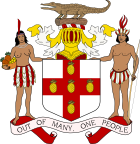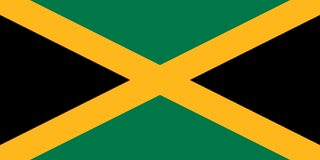
The politics of Antigua and Barbuda takes place in a framework of a unitary parliamentary representative democratic monarchy, wherein the Sovereign of Antigua and Barbuda is the head of state, appointing a Governor-General to act as vice-regal representative in the nation. A Prime Minister is appointed by the Governor-General as the head of government, and of a multi-party system; the Prime Minister advises the Governor-General on the appointment of a Council of Ministers. Executive power is exercised by the government. Legislative power is vested in both the government and the two chambers of the Parliament. The bicameral Parliament consists of the Senate and the House of Representatives.
The politics of Grenada takes place in a framework of a parliamentary representative democracy, whereby the Prime Minister is the head of government. Grenada is an independent Commonwealth realm. It is governed under a multi-party parliamentary system whose political and legal traditions closely follow those of the United Kingdom; it has a prime minister and a cabinet, and a bicameral Parliament with an elected House of Representatives and an appointed Senate. Executive power is exercised by the government. Legislative power is vested in both the government and parliament. Constitutional safeguards include freedom of speech, press, worship, motion, and association. Grenada is a member of the eastern Caribbean court system. The Judiciary is independent of the executive and the legislature. Jurisprudence is based on English common law.
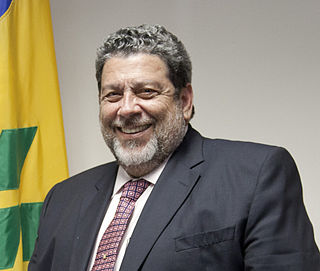
Ralph Everard Gonsalves is a Vincentian politician. He currently serves as the 4th Prime Minister of Saint Vincent and the Grenadines, and leader of the Unity Labour Party (ULP).
The Jamaica Labour Party (JLP) is one of the two major political parties in Jamaica, the other being the People's National Party (PNP). While its name might suggest that it is a social democratic party, the JLP is actually a conservative party. However, it has longstanding ties to the Jamaican labour movement.
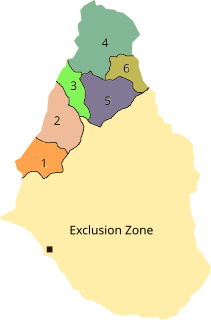
Elections in Montserrat take place within the framework of a multi-party democracy and a parliamentary system. The Legislative Assembly is directly elected, and a Chief Minister is selected by the party or coalition with the most seats in the Assembly.
The United Workers Party is a conservative political party in Saint Lucia, currently led by former Tourism Minister Allen Chastanet who defeated former Prime Minister Stephenson King in a July 28, 2013 leadership contest. The party was led previously by John Compton.
The Bonaire Patriotic Union is a political party in Bonaire, Caribbean Netherlands. At the legislative elections in the Netherlands Antilles, 18 January 2002, the party won 3.6% of the popular vote and 2 out of 22 seats. At the elections in the Netherlands Antilles of 27 January 2006, the party won again 2 out of 22 seats. It's a member of the CDI.
The Saint Vincent and the Grenadines Green Party is a green political party in Saint Vincent and the Grenadines. The party is currently led by Ivan O'Neal, and has no seats in the House of Assembly.

General elections were held in Barbados on 3 November 1966. Unlike previous elections, which used single-member constituencies, this election was contested using two-member constituencies, in which each voter had two votes. The result was a victory for the Democratic Labour Party, which won 14 of the 24 seats. Voter turnout was 79.7%.
General elections were held in Montserrat on 8 October 1991. The result was a victory for the National Progressive Party (NPP), which won four of the seven seats in the Legislative Council. NPP leader Reuben Meade became Chief Minister.

The Liberator Party was a right-wing political party in Guyana.
The Caribbean National Labour Party was a political party in Trinidad and Tobago. It contested the 1956 general elections, but failed to win a seat. The party did not contest any further elections.
The Caribbean Socialist Party was a political party in Trinidad and Tobago. Led by Patrick Solomon, it contested the 1950 general elections together with the Butler Party, receiving 2.4% of the vote and winning a single seat, taken by A. P. T. James. It did not contest any further elections.
The People's Empowerment Party was a political party in Trinidad and Tobago. It contested the 2000 general elections, but received just 0.3% of the vote and failed to win a seat. The party did not contest any further national elections, but did run in elections in Tobago. In the 2001 Tobagan House of Assembly elections it won 7.1% of the vote, but again failed to win a seat.
General elections were held in Montserrat on 20 February 1952. They were the first elections in Montserrat held under universal suffrage, which had been introduced the previous year. The result was a victory for the Montserrat Labour Party, which won all five seats in the Legislative Council.
General elections were held in Montserrat on 18 March 1955. The result was a victory for the Montserrat Labour Party, which won three of the five seats in the Legislative Council. The other two seats were taken by the independent candidate R W Griffiths and a Merchant Planter, William Lleweyn Wall.
General elections were held in Montserrat in 1966. The result was a victory for the Montserrat Labour Party, which won five of the seven seats in the Legislative Council. MLP leader William Henry Bramble remained Chief Minister.
General elections were held in Montserrat on 15 December 1970. The result was a victory for the Progressive Democratic Party (PDP), which won all seven seats in the Legislative Council, whilst the Montserrat Labour Party (MLP), which had won every election since the introduction of universal suffrage in 1951, lost all four of its seats. PDP leader Percival Austin Bramble became Chief Minister, replacing his father and MLP leader, William Henry Bramble.
The Montserrat Workers' Progressive Party (MWPP) was a political party in Montserrat, led by John Osborne.
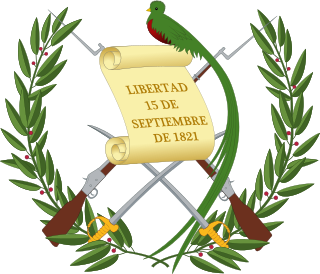
The Anti-Communist Unification Party was a right-wing political party in Guatemala.
